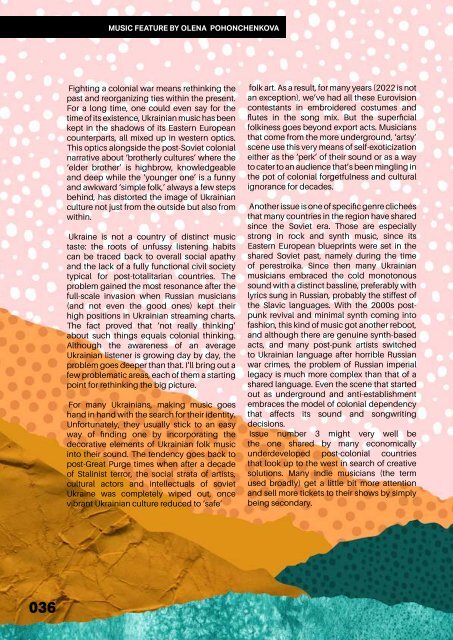RED DOOR 31
Red Door Issue #31 Featuring the art of Jessa Dupuis New titles by Red Press coming this spring 2023 I KNOW WOMEN by Ly de Angeles ............ pg. 15-16 VISUAL POETRY BY Sofia del Carmen Rodriguez Fernandez...... pg.17-18 THAT DAY ARRIVED In memory of Knud Sørensen By Michael Favala Goldman ...........................pg. 20-23 IN THE EYES OF THE BEHOLDER By Martin Andersen.............................................pg. 30-31 POETRY .................................................pg.32-34 IN THIS ISSUE BY Dr.Alex Van Huynh Beatriz Seelaender Rey Fairburn Rose Menyon Heflin ART, FILM & MUSIC by: MEANWHILE, IN AUSTRALIA The Neon Rebel ...................................................pg.24-29 WHY YOU DON’T KNOW A THING ABOUT UKRAINIAN MUSIC By Olene Pohonchenkova ...............................pg.36-39 FEATURED ARTIST Jessa Dupuis .........................................................pg.40-45 The Poetic Phonotheque presents: New poetry films added to the collection: pg.46-52 (from the Nature & Culture - Poetry Film Festival) and more! www.reddoormagazine.com Pre-order your copy at www.reddoormagazine.com/shop
Red Door Issue #31
Featuring the art of Jessa Dupuis
New titles by Red Press coming this spring 2023
I KNOW WOMEN by Ly de Angeles ............ pg. 15-16
VISUAL POETRY BY
Sofia del Carmen Rodriguez Fernandez...... pg.17-18
THAT DAY ARRIVED
In memory of Knud Sørensen
By Michael Favala Goldman ...........................pg. 20-23
IN THE EYES OF THE BEHOLDER
By Martin Andersen.............................................pg. 30-31
POETRY .................................................pg.32-34
IN THIS ISSUE BY
Dr.Alex Van Huynh
Beatriz Seelaender
Rey Fairburn
Rose Menyon Heflin
ART, FILM & MUSIC by:
MEANWHILE, IN AUSTRALIA
The Neon Rebel ...................................................pg.24-29
WHY YOU DON’T KNOW A THING
ABOUT UKRAINIAN MUSIC
By Olene Pohonchenkova ...............................pg.36-39
FEATURED ARTIST
Jessa Dupuis .........................................................pg.40-45
The Poetic Phonotheque presents:
New poetry films added to the collection: pg.46-52
(from the Nature & Culture - Poetry Film Festival)
and more!
www.reddoormagazine.com
Pre-order your copy at www.reddoormagazine.com/shop
Create successful ePaper yourself
Turn your PDF publications into a flip-book with our unique Google optimized e-Paper software.
MUSIC FEATURE BY OLENA POHONCHENKOVA<br />
Fighting a colonial war means rethinking the<br />
past and reorganizing ties within the present.<br />
For a long time, one could even say for the<br />
time of its existence, Ukrainian music has been<br />
kept in the shadows of its Eastern European<br />
counterparts, all mixed up in western optics.<br />
This optics alongside the post-Soviet colonial<br />
narrative about ‘brotherly cultures’ where the<br />
‘elder brother’ is highbrow, knowledgeable<br />
and deep while the ‘younger one’ is a funny<br />
and awkward ‘simple folk,’ always a few steps<br />
behind, has distorted the image of Ukrainian<br />
culture not just from the outside but also from<br />
within.<br />
Ukraine is not a country of distinct music<br />
taste: the roots of unfussy listening habits<br />
can be traced back to overall social apathy<br />
and the lack of a fully functional civil society<br />
typical for post-totalitarian countries. The<br />
problem gained the most resonance after the<br />
full-scale invasion when Russian musicians<br />
(and not even the good ones) kept their<br />
high positions in Ukrainian streaming charts.<br />
The fact proved that ‘not really thinking’<br />
about such things equals colonial thinking.<br />
Although the awareness of an average<br />
Ukrainian listener is growing day by day, the<br />
problem goes deeper than that. I’ll bring out a<br />
few problematic areas, each of them a starting<br />
point for rethinking the big picture.<br />
For many Ukrainians, making music goes<br />
hand in hand with the search for their identity.<br />
Unfortunately, they usually stick to an easy<br />
way of finding one by incorporating the<br />
decorative elements of Ukrainian folk music<br />
into their sound. The tendency goes back to<br />
post-Great Purge times when after a decade<br />
of Stalinist terror, the social strata of artists,<br />
cultural actors and intellectuals of soviet<br />
Ukraine was completely wiped out, once<br />
vibrant Ukrainian culture reduced to ‘safe’<br />
folk art. As a result, for many years (2022 is not<br />
an exception), we’ve had all these Eurovision<br />
contestants in embroidered costumes and<br />
flutes in the song mix. But the superficial<br />
folkiness goes beyond export acts. Musicians<br />
that come from the more underground, ‘artsy’<br />
scene use this very means of self-exoticization<br />
either as the ‘perk’ of their sound or as a way<br />
to cater to an audience that’s been mingling in<br />
the pot of colonial forgetfulness and cultural<br />
ignorance for decades.<br />
Another issue is one of specific genre clicheés<br />
that many countries in the region have shared<br />
since the Soviet era. Those are especially<br />
strong in rock and synth music, since its<br />
Eastern European blueprints were set in the<br />
shared Soviet past, namely during the time<br />
of perestroika. Since then many Ukrainian<br />
musicians embraced the cold monotonous<br />
sound with a distinct bassline, preferably with<br />
lyrics sung in Russian, probably the stiffest of<br />
the Slavic languages. With the 2000s postpunk<br />
revival and minimal synth coming into<br />
fashion, this kind of music got another reboot,<br />
and although there are genuine synth-based<br />
acts, and many post-punk artists switched<br />
to Ukrainian language after horrible Russian<br />
war crimes, the problem of Russian imperial<br />
legacy is much more complex than that of a<br />
shared language. Even the scene that started<br />
out as underground and anti-establishment<br />
embraces the model of colonial dependency<br />
that affects its sound and songwriting<br />
decisions.<br />
Issue number 3 might very well be<br />
the one shared by many economically<br />
underdeveloped post-colonial countries<br />
that look up to the west in search of creative<br />
solutions. Many indie musicians (the term<br />
used broadly) get a little bit more attention<br />
and sell more tickets to their shows by simply<br />
being secondary.<br />
036
















